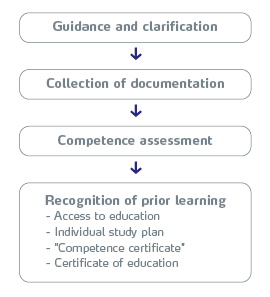
4 From guidance to recognition of prior learning

The success or otherwise of assessment and recognition of prior learning depends entirely on whether the methods used ensure a reliable assessment of an individual's prior learning. This is a prerequisite for
people having faith in the assessments and for their acceptance within the education system and on the labour market. The competence assessment in the education system also requires qualified guidance and
support for the documentation of the individual's prior learning.
The figure illustrates the process of making a competence assessment:

From the individual's point of view, access to guidance, documentation, assessment and recognition should be presented as a coherent offer.
Guidance
There must be good opportunities to obtain guidance about assessment and recognition of prior learning within the education system. Educational institutions should guide stud- ents/applicants about their
options and about the regulations, giving the individual the chance to clarify ambitions and goals, including establishing the relevant level of education and the course-specific orientation of the assessment.
Information and guidance should also be on offer within the guidance system and in cooperation with other relevant guidance providers. There must be a system in place to refer the individual to a relevant
educational institution, and access should be provided to electronically based information on the opportunities of getting a competence assessment.
Personal documentation of prior learning
The individual is responsible for collecting the relevant documentation of his or her prior learning, which is to be included in the competence assessment. This may include documentation from employers, from
participation in seminars, training activities or liberal adult education activities, etc. It could also be the individual's own assessment of relevant experience gained from, for instance, working as a volunteer for
a charity. The guidance provided is to facilitate access to the tools that support the documentation.
Competence assessment
Typically, it is an educational institution that carries out a competence assessment, based on the individual's documentation of prior learning. The assessment has to be produced on the basis of a variety of
methods and tools with a view to the individual's prior learning being demonstrated and assessed in a reliable way vis-à-vis the specific requirements of the education programme. If required, there must be
the option of a competence clarifying course of up to a few days' duration. Other forms of evaluation, other than traditional tests, must also be included, and if relevant, such evaluations could take place in e.g. the workplace.
The methods that can be used for assessment of prior learning include:
- Written documentation of competences in the form of a CV or a personal document file etc. that can form part of the basis for the assessment.
- Structured interviews during the different phases of the assessment process, including for instance use of forms for assessing the individual's competence against the objectives and course-specific content of
the education programme aimed for.
- Observation and assessment of the applicant's skills and competences. For example, the applicant may be asked to solve a practical task, which is relevant in relation to the competences that the education
and training programme aims for.
- Tests and examinations to assess the individual's theoretical knowledge and practical skills.
A competence assessment is likely to include a combination of different methods, adjusted in accordance with the individual's qualifications and choice of education. We provide below two examples of the
process from guidance to recognition of prior learning.
After completion of the assessment, the educational institution will normally, on request, issue a 'competence certificate', which is a certificate documenting the result of the assessment.
Example
For many years, Tove Hansen (TH) has worked as an unskilled clerk in a major export company, and now she would like her skills documented to be able to prove her competence. Having discussed the
issue with the management, she contacts the local business college to obtain a competence assessment within office work. This was the beginning of the following process:
Guidance interview at the college:
- Information on the administrative/secretarial course at the college and clarification of TH's preferences as regards specialisation
- Appointment fixed for competence assessment
- TH receives a
competence documentation form
Collection of documentation of prior learning:
- TH's certificates from previous school education
- TH's own description of job experience and competences
- References from employers and from staff of the association that
TH has been working for
- Documentation of in-house supplementary training, adult vocational courses and an evening class in English
Competence assessment – 3 days:
- Review of TH's personal portfolio
- Testing of practical and theoretical knowledge and skills, including tests in computer literacy test and English
- Concluding interview and overall assessment of prior
learning visà-vis the administrative/secretarial course at the college
Recognition of Tove Hansen's prior learning:
- First year of the basic vocational education and training (former version), adult vocational training (AMU) courses and in-house IT courses
- Employment in accounts and HR administration
- Evening class
in English
- Treasurer in a major sports club
Education plan for a basic adult education programme within secretarial/administrative skills lasting 14 weeks:
1. Computer literacy level 3 and spreadsheets level 1 (AMU courses)
2. Specialist subjects: sales and marketing, quality and service as well as planning tools (VET single subjects at college)
3. Concluding examination
Recognition of prior learning
The recognition of a given individual's competence assessment depends on the objective as well as the result of the assessment of the individual's prior learning vis-à-vis a given education and training
programme. The recognition may give admission to an education programme of the individual's choice or a reduction in the length of an education programme, or it may result in the issue of formal
documentation in the form of certificates of education.
When an individual is seeking admission to an education and training programme or a reduction in the length of an education programme, the particular institution of education will continue to have academic
responsibility in its decision on any given assessment and recognition.
If a competence assessment provides the basis for the issue of certificates of education purely on the basis of recognition of prior learning, the recognition of the assessment must be effected by independent
bodies within the individual areas of education, e.g. external examiners, trade committees or other special evaluation boards.
In the long term, it may be considered whether there is a general need to establish institution-independent access to recognition of prior learning assessments that can be implemented within the individual
areas of education and training.
Example
Thomas Berg is a skilled plumber and wants to start his own business as a certified engineer. He has contacted the student guidance office at the nearest academy of professional higher education and has
received information on the two-year programme leading to certified plumber, and the possibilities of having the course shortened. This was the beginning of the following process:
Collection of documentation of prior learning:
- TB's certificates of education from previous schooling, education and courses
- Description of and documentation for job experience and competences within the plumber (gas) sector
- Documentation for
coach training in a sports association
Application for admission to the HVAC course:
- Application for a reduction in the length of the course
- A completed assessment form
- TB's documentation for relevant qualifications and competences
Guidance interview and competence assessment – 1 day:
- Review of assessment form and documentation material
- Test in quality management and costing
- Concluding interview and overall assessment of credit
Recognition of Thomas Berg's prior learning:
- The PC driving license, A-certificate and a course in organisational structure taken in conjunction with the Danish Teknonom course (specialised technical study)
- Job experience and competences within
the provision of quotations, quality management and accounts
- Coach training from Danish Gymnastics and Sports Associations
The HVAC course is reduced by 20 weeks:
1. Reduction in information technology, corporate techniques/costing
2. Reduction in the subject quality
3. Reduction in the subject organisational structure
4. Concluding long essay in specialist subject
 This page is included in the publication "Recognition of Prior Learning within the education system" as chapter 4 of 6
This page is included in the publication "Recognition of Prior Learning within the education system" as chapter 4 of 6
© The Ministry of Education 2005
|


